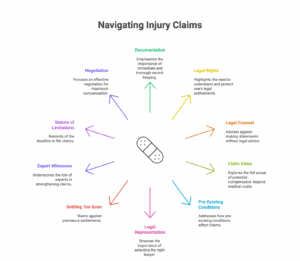So, you’ve been in an accident. It’s stressful, scary, and you’re probably dealing with pain and frustration. On top of everything else, the process of filing an injury claim can feel like wading through a legal swamp. But don’t worry, you’re not alone. This guide reveals ten key secrets to help you understand your rights and maximise your chances of getting the compensation you deserve.
1. Document Everything Immediately After Your Accident
Think of yourself as a detective at a crime scene. The more evidence you gather upfront, the stronger your case will be. This means taking pictures of everything: vehicle damage, your injuries, the accident scene, road conditions, and even license plates. Get contact information from witnesses. Write down your recollection of events as soon as possible, while it’s still fresh in your mind. Don’t underestimate the power of a detailed journal – the smallest detail can be crucial later.
Example: Imagine a slip-and-fall accident in a grocery store. A photo of the “wet floor” sign (or the lack of one) is gold. Note the time, weather, and any conversations you had with store employees.
2. Understanding Your Legal Rights Regarding Injury Claims
After an accident, you have specific rights that protect you. You have the right to seek medical treatment, even if you’re not sure you’re seriously injured. You have the right to file an insurance claim against the at-fault party. You have the right to legal representation. Understanding these rights is the first step toward getting fair compensation. Don’t let insurance companies intimidate you or pressure you into accepting a settlement that doesn’t cover your damages.
Example: In most states, you have the right to choose your own doctor. An insurance company cannot dictate where you receive treatment.
3. Don’t Give Recorded Statements Without Legal Counsel After an Accident
Insurance adjusters may seem friendly, but remember, they work for the insurance company, not you. They are trained to ask questions that could potentially minimise your claim. Never give a recorded statement without first speaking to an attorney. Anything you say can and will be used against you. A lawyer can help you prepare for the statement and ensure you don’t inadvertently harm your case.
Example: An adjuster might ask, “Are you feeling any pain today?” Answering “No” (even if you’re just having a good day) can be used to argue your injuries aren’t serious.
4. The True Value of Your Injury Claim (Beyond Medical Bills)
Many people mistakenly believe an injury claim only covers medical expenses. While medical bills are a significant component, your claim can also include lost wages (past and future), pain and suffering, property damage, emotional distress, and even loss of enjoyment of life. Quantifying these damages can be complex, making a lawyer’s expertise invaluable.
Example: If you can no longer participate in your favourite hobby due to your injuries, you can claim damages for that loss of enjoyment. A recent study shows that pain and suffering damages average three times the amount of medical expenses in similar cases.
5. Pre-Existing Conditions and Your Accident Legal Case: What You Need to Know
Having a pre-existing condition doesn’t automatically disqualify you from receiving compensation after an accident. The key is proving that the accident aggravated the pre-existing condition, making it worse than it was before. Medical records are crucial in this regard, as they document the change in your condition following the accident.
Example: If you had mild back pain before the accident, but now require surgery due to accident-related trauma, you can claim damages related to the aggravation of your condition.
6. Choosing the Right Legal Representation for Your Injury Claim
Not all lawyers are created equal. When it comes to injury claims, you need a lawyer with specific experience in personal injury law. Look for someone who has a proven track record of success, a strong understanding of the law, and excellent communication skills. Ask about their experience with cases similar to yours. Consider a lawyer who works on a contingency fee basis, meaning they only get paid if you win your case.
Example: Ask potential lawyers about their experience negotiating with specific insurance companies. Some firms specialise in particular types of accidents, such as car accidents or medical malpractice.
7. Settling Too Soon: A Critical Accident Legal Pitfall
Insurance companies often offer quick settlements to injured parties. While the money might seem tempting, especially when bills are piling up, accepting a settlement too soon can be a huge mistake. You might not fully understand the extent of your injuries or the long-term consequences. Wait until you’ve reached maximum medical improvement (MMI) and have a clear understanding of your future medical needs before considering any settlement offer.
Example: Soft tissue injuries like whiplash can take months to fully manifest. Don’t settle until your doctor confirms your prognosis.
8. The Importance of Accident Reconstruction and Expert Witnesses
In complex accident cases, particularly those involving serious injuries or disputes over liability, accident reconstruction experts and other expert witnesses play a crucial role. These experts can analyse the evidence, recreate the accident scene, and provide objective testimony that supports your claim.
Example: In a car accident where fault is disputed, an accident reconstruction expert can analyse skid marks, vehicle damage, and witness statements to determine the sequence of events and who was at fault.
9. Statute of Limitations: Don’t Miss Your Deadline to File an Injury Claim
Every state has a statute of limitations, which sets a deadline for filing a personal injury lawsuit. Missing this deadline means you lose your right to sue, regardless of the merits of your case. It’s essential to consult with an attorney as soon as possible after an accident to ensure you don’t miss the deadline. The statute of limitations varies by state, but it is often two years.
Example: In California, the statute of limitations for personal injury cases is typically two years from the date of the accident.
10. Negotiating Effectively for Maximum Injury Compensation After an Accident Legal Battle
Negotiation is a critical part of the injury claim process. Your lawyer will handle this, presenting evidence, countering insurance company arguments, and fighting for the maximum compensation you deserve. Be prepared for a back-and-forth process, and trust your attorney’s guidance on when to accept a settlement offer or proceed to trial.
Example: A lawyer might use comparable case verdicts from your jurisdiction to demonstrate the value of your claim. Skilled negotiation often leads to significantly higher settlements than the initial offer.

Knowing these secrets can significantly improve your chances of a successful injury claim. Remember, seeking legal advice from a qualified attorney is always the best course of action after an accident. Good luck!





